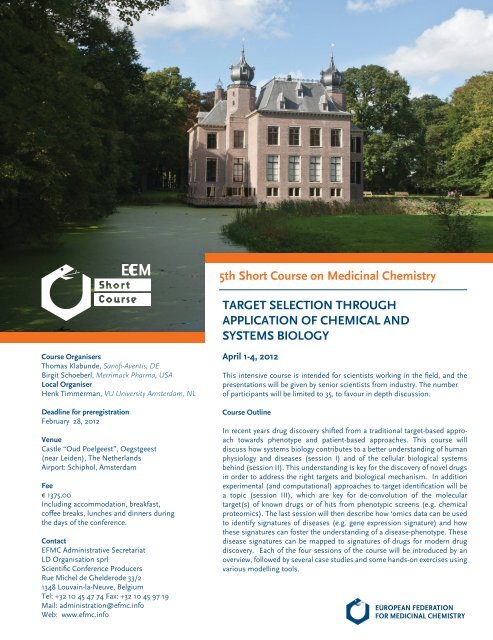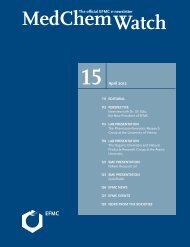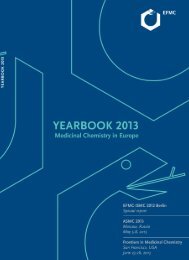You also want an ePaper? Increase the reach of your titles
YUMPU automatically turns print PDFs into web optimized ePapers that Google loves.
Course Organisers<br />
Thomas Klabunde, Sanofi-Aventis, DE<br />
Birgit Schoeberl, Merrimack Pharma, USA<br />
Local Organiser<br />
Henk Timmerman, VU University Amsterdam, NL<br />
Deadline for preregistration<br />
February 28, 2012<br />
Venue<br />
Castle “Oud Poelgeest”, Oegstgeest<br />
(near Leiden), The Netherlands<br />
Airport: Schiphol, Amsterdam<br />
Fee<br />
€ 1375,00<br />
Including accommodation, breakfast,<br />
coffee breaks, lunches and dinners during<br />
the days of the conference.<br />
Contact<br />
<strong>EFMC</strong> Administrative Secretariat<br />
LD Organisation sprl<br />
Scientific Conference Producers<br />
Rue Michel de Ghelderode 33/2<br />
1348 Louvain-la-Neuve, Belgium<br />
Tel: +32 10 45 47 74 Fax: +32 10 45 97 19<br />
Mail: administration@efmc.info<br />
Web: www.efmc.info<br />
5th Short Course on Medicinal Chemistry<br />
TARGET SELECTION THROUGH<br />
APPLICATION OF CHEMICAL AND<br />
SYSTEMS BIOLOGY<br />
April 1-4, 2012<br />
This intensive course is intended for scientists working in the field, and the<br />
presentations will be given by senior scientists from industry. The number<br />
of participants will be limited to 35, to favour in depth discussion.<br />
Course Outline<br />
In recent years drug discovery shifted from a traditional target-based approach<br />
towards phenotype and patient-based approaches. This course will<br />
discuss how systems biology contributes to a better understanding of human<br />
physiology and diseases (session I) and of the cellular biological systems<br />
behind (session II). This understanding is key for the discovery of novel drugs<br />
in order to address the right targets and biological mechanism. In addition<br />
experimental (and computational) approaches to target identification will be<br />
a topic (session III), which are key for de-convolution of the molecular<br />
target(s) of known drugs or of hits from phenotypic screens (e.g. <strong>chem</strong>ical<br />
proteomics). The last session will then describe how ‘omics data can be used<br />
to identify signatures of diseases (e.g. gene expression signature) and how<br />
these signatures can foster the understanding of a disease-phenotype. These<br />
disease signatures can be mapped to signatures of drugs for modern drug<br />
discovery. Each of the four sessions of the course will be introduced by an<br />
overview, followed by several case studies and some hands-on exercises using<br />
various modelling tools.





